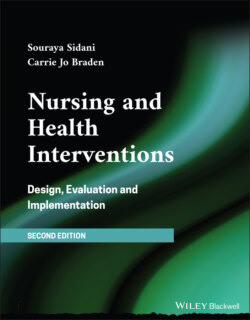Читать книгу Nursing and Health Interventions - Souraya Sidani - Страница 9
Preface
ОглавлениеInterventions constitute the essence of nursing and health care. To be successful in promoting health and well‐being, health interventions have to be carefully designed, delivered, and evaluated, before they are implemented in practice.
Over the past decades, advances in intervention research generated a range of designs, methods, and procedures for developing, providing, and determining the effectiveness of health interventions. The advances were motivated by cumulating evidence pointing to limitations in traditional approaches to intervention research, by the widening recognition of the value of client‐centered care, and by the increasing demand for interventions that are acceptable and adaptable to practice and for evidence that is relevant and meaningful in informing treatment decisions in practice. Practice‐relevant evidence indicates: what clients, presenting with which personal and health characteristics, benefit, to what extent, from what health intervention, provided in what mode or format and what dose, in what context, as well as how health interventions work in producing the beneficial outcomes that are of importance to clients.
Advances in intervention research have been described in a multitude of sources spanning different disciplines and professions, and often using different terminology. This book is intended to serve as a helpful “one‐stop” resource for researchers and health professionals planning to engage in intervention research. The book is divided into five sections. The first section provides an overview of the conditions that instigated the advances, and of the systematic process for designing and evaluating health interventions. The second section presents approaches for developing new interventions that culminate in the generation of the intervention theory. The central role of the theory in guiding the planning and conduct of intervention delivery and evaluation is clarified. The third section details approaches and methods for delivering the intervention with fidelity and flexibility. The fourth section describes traditional and alternative research designs, methods, and procedures for evaluating the interventions’ acceptance, feasibility, process, and outcomes. The fifth section provides an overview of initiatives aimed at implementing evidence‐based interventions in practice.
The content of the book covers conceptual, empirical, and practical knowledge needed for the optimal design, delivery, evaluation, and implementation of health interventions. The conceptual knowledge clarifies the rationale or the “why” of the approaches and methods for designing and evaluating interventions; it explains the principles and logic underlying them and discusses their strengths and limitations. Empirical knowledge supports the utility of the approaches and methods by providing evidence on their strengths and limitations. The conceptual and empirical knowledge are combined to justify methodological decisions in intervention research. Practical knowledge describes the “what” and “how” of the approaches and methods; it provides guidance for applying them.
The goal is to support students, researchers, and health professionals in making appropriate decisions in:
1 Selecting the optimal approaches and methods for designing, delivering, evaluating, and implementing health interventions.
2 Generating evidence that informs treatment decisions in practice.
3 Promoting the adoption, adaptation, and implementation of intervention in practice, which ultimately lead to the provision of high‐quality, client‐centered, healthcare.
